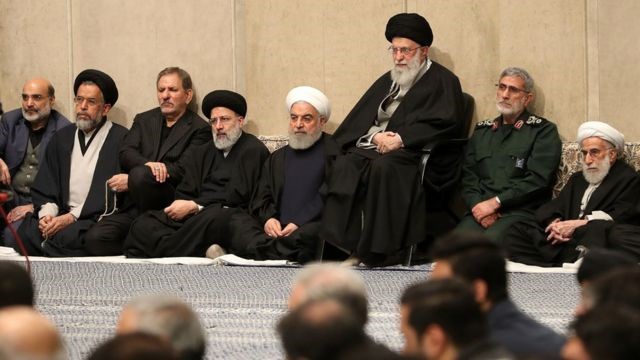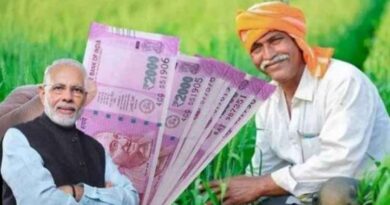Whose move in Iran? supreme leader or president
Iran is a country whose political structure is quite complex to understand. On the one hand, there is a network of unelected institutions controlled by the Supreme Leader, and on the other, there is a parliament and president elected by Iranian voters. Both these systems work together.
But how does this complex political system work and who holds the keys to power in it?
Supreme leader
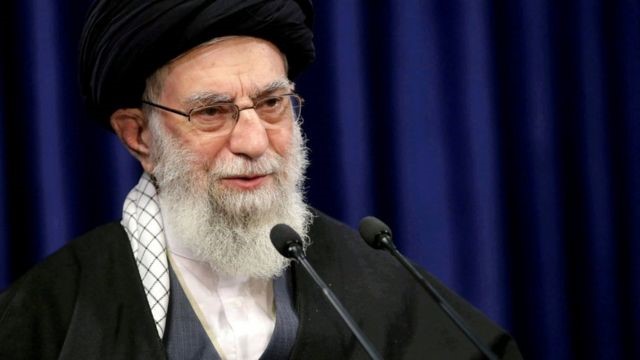
Ayatollah Ali Khamenei has been Iran’s supreme religious leader since 1989
The post of supreme leader is considered the most powerful in the Iranian polity. Since the Islamic Revolution of 1979, only two people have reached the post of Supreme Leader. The first of these was Ayatollah Ruhollah Khomeini, the founder of the Iranian Republic, and the second was his successor, the current Ayatollah Ali Khamenei. Khomeini raised the post to the highest rank in Iran’s political structure after the overthrow of the regime of Shah Mohammad Reza Pahlavi.
The supreme leader is the commander-in-chief of Iran’s armed forces. They have control of the security forces. He appoints the heads of the judiciary, half of the influential Guardian Council members, leaders of Friday prayers, heads of state television and radio networks. The supreme leader’s billion-dollar charities control a large part of the Iranian economy.
Ayatollah Ali Khamenei became supreme leader in 1989 after the death of former Supreme Leader Khomeini. Since becoming supreme leader, Khamenei has maintained a firm grip on power. They have not allowed anti-incumbency voices to rise.
President

Iran’s President Hassan Rouhani
Elections for the presidency of Iran are held every four years. The person who wins the election can become President for a maximum of two terms at a time. According to the Constitution of Iran, the President is the second most powerful person in Iran. He is the head of the executive whose responsibility is to get the constitution followed.
From internal policies to foreign policy, the President has a lot of interference. But the final decision on national issues rests with the supreme leader.
On June 18, Iranian voters voted to choose a successor to liberal religious leader and President Hassan Rouhani. Rouhani has won unilaterally against hardline opponents in the last two elections. On both occasions Rouhani garnered more than fifty percent of the votes in the first round itself.
All those running for the presidency have to get approval from the Guardian Council, a gathering of 12 theologians and legal experts. The Guardian Council approved only seven out of 590 candidates for this election. Only these seven people have registered in the elections. No woman was allowed to contest elections. Of these seven, three withdrew their names two days before the polls. A total of four candidates were left till the day of polling.
Parliament

President Hassan Rouhani addressing the Majlis, the Iranian Parliament
The Majlis, a parliament with 290 members in Iran, is elected through general elections every four years. Parliament has the power to make laws. Along with this, there is a power to dismiss the annual budget.
Parliament can summon the President and the ministers of the government and can initiate a case of impeachment against them. However, all laws passed by Parliament must be approved by the Guardian Council. The hardliners have made a solid lead in the 2021 parliamentary elections after more than 700 potential candidates (mostly reformers and liberals) were disqualified from the Guardian Council.
Guardian Council
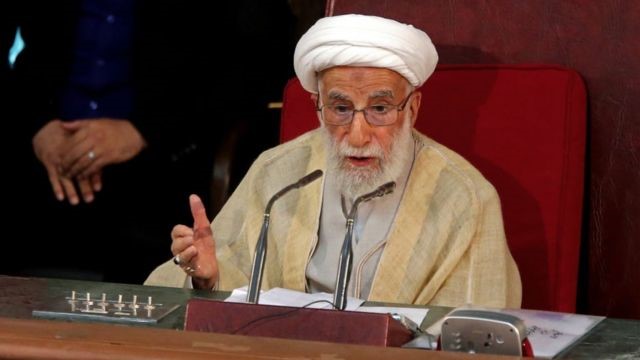
Ahmed Jannati heads the Guardian Council and the Committee of Experts
The Guardian Council is the most influential body in Iran, whose job is to approve or block all laws passed by parliament. This body can ban candidates from trying their luck in parliamentary elections or elections to a committee of experts.
There are six theologians in this council, who are appointed by the Supreme Leader. Along with this, there are six judges who are nominated by the judiciary and their names are approved by the Parliament. Members are elected in a phased manner over an interval of six years, with members changing every three years.
The council has a majority of fundamentalists, including chairman Ayatollah Ahmed Jannati.
Committee of Experts
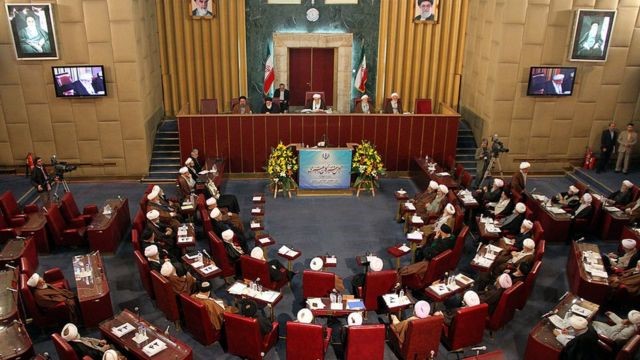
Meeting of the Committee of Experts in Tehran (2014 photo)
It is a strong organization of 88 members, which includes Islamic scholars and Ulema. The work of this institution is from the appointment of the Supreme Leader to keep an eye on their performance. If the institution feels that the Supreme Leader is not able to do his work, then this institution also has the power to remove the Supreme Leader.
However, it has never happened that the Supreme Leader’s decisions have been challenged. But this institution has become very important due to the constant concerns about the health of 82-year-old Ayatollah Ali Khamenei.
If the supreme leader dies, this body conducts a secret election, in which the person with a clear majority is declared the successor. Elections for the members of the organization are held every eight years.
The last election was held in 2016, when liberals and reformists won more than 60 per cent of the seats. Whereas in the earlier elections, this section had won only 25% of the seats. The current president of the organization is Ayatollah Ahmed Jannati, a fanatic and also the head of the Guardian Council.
Expediency Council
This council gives advice to the Supreme Leader. In case of dispute between the Guardian Council and Parliament in legal matters, this body has the right to decide. The Supreme Leader appoints all the 45 members of this council who are well-known religious, social and political figures.
The current president of the organization is Ayatollah Sadeq Amoli Larijani, a radicalist and former judiciary chief.
Head of Judiciary
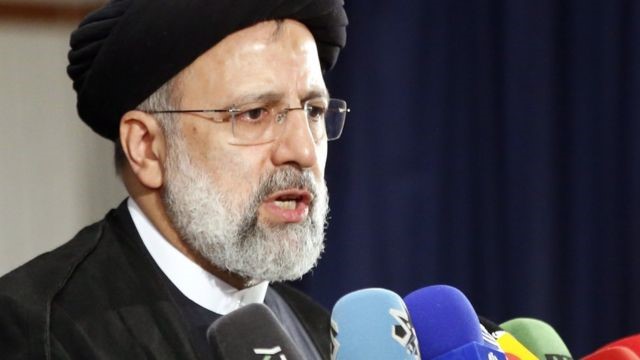
EPA Abraham Raisi to head Iran’s Supreme Court since 2019
The Chief Justice of Iran is appointed by the Supreme Leader. The Chief Justice is responsible only to the Supreme Leader.
He is the head of the judiciary of the country. The courts under this designation define the observance of Islamic law and legal policies. Chief Justice Ibrahim Raisi, a radical ulema, also nominates six original members of the Guardian Council. The judiciary along with the Department of Security and Intelligence has taken action against the opposing voices. Human rights activists often accuse the judiciary of unfairly pursuing legal cases against people arrested in strangely defined matters of national security.
Voter
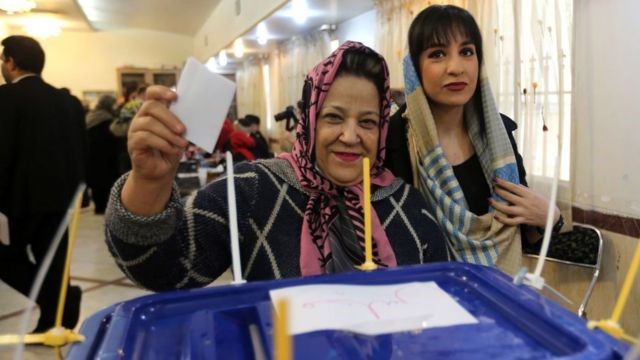
Iran’s parliamentary election in 2020 saw the lowest voter turnout since the Iranian Revolution
Out of Iran’s 83 million population, about 58 million voters, ie people who have completed 18 years of age, can vote.
Young people have a majority in the electorate. More than half of the population is under 30 years of age. Since the Islamic Revolution in 1979, the voter turnout has been more than 50%.
However, in the 2021 parliamentary elections, due to the bad condition of the economy and dissatisfaction with the Ulema, most people were seen distancing from voting.
The Armed Forces
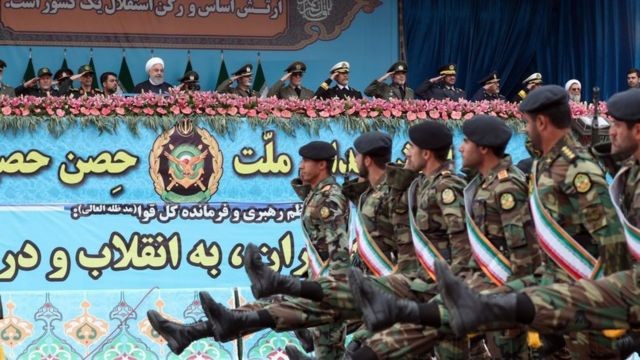
Revolutionary Guards are independent of the military
Iran’s armed forces consist of the Islamic Revolutionary Guard Corps (IRGC) and the General Army.
The IRGC was formed after the revolution with the aim of protecting the Islamic system and establishing a power parallel to that of the common army. However, it has now become a massive armed, political and economic force with close ties to the Supreme Leader.
The Revolutionary Guards has its own land army, navy and air force. The task of overseeing Iran’s strategic weapons is also with this institution.
The organization also controls the Paramilitary Buses Resistance Force, which has played a role in quelling internal opposition.
All senior IRGC officers and military commanders are appointed by the Supreme Leader who is also the Chief Commander. These commanders and officers are answerable only to the Supreme Leader.
Cabinet

Iran’s President Hassan Rouhani at a cabinet meeting in Tehran
The members of the Cabinet or the Council of Ministers are elected by the President. Their names should be approved by the Parliament, which can also prosecute ministers. This cabinet is headed by the President or the First Vice-President, who is responsible for matters related to the cabinet.

